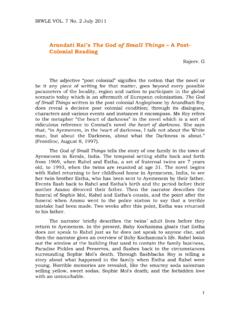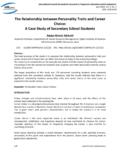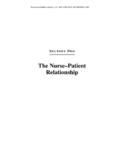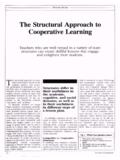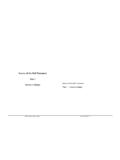Transcription of Ecocriticism in Indian Fiction - July, 2017
1 IRWLE VOL. 7 No. I January 2011 1 Ecocriticism in Indian Fiction - Kumari Shikha Nature and literature have always shared a close relationship as is evidenced in the works of poets and other writers down the ages in almost all cultures of the world. Today the intimate relationship between the natural and social world is being analyzed and emphasized in all departments of knowledge and development. The literary critic tries to study how this close relationship between nature and society has been textualized by the writers in their works. In this context two terms have become very important today ecology and Ecocriticism . India is a country with variety of ecosystems which ranges from Himalayas in the north to plateaus of south and from the dynamic Sunderbans in the east to dry Thar of the West.
2 With time, however, these ecosystems have been adversely affected due to increasing population and avarice of mankind. Literature could not remain unaffected from this depletion and my paper is on that how the concern for nature changes in Indian literature from reverence to destruction. The two components of nature, organisms and their environment are not only much complex and dynamic but also interdependent, mutually reactive and interrelated. Ecology relatively a new science, deals with the various principles which govern such relationships between organisms and environment. 1 Today ecology is defined as the way in which plants, animals and people are related to each other and their environment. In this relationship they are so much interdependent on each other that any disturbance in one disturbs the other.
3 History has proved this every now and then that with every change in the civilisation the relationship of animals and human beings have also changed and the effect on civilisation of the changes in environment has been so acute that sometimes it has wiped the whole civilisation from the face of the earth. Therefore, concern for ecology is one of the most discussed issues today. It is the concern of every country to replenish the diminishing factors of ecology which threatens human beings the most. Literature well known for reflecting the contemporary issues could not have remained unaffected from this theme. The world of literature throngs with works dealing with beauty and power of nature. However, the concern for ecology and the threat that the continuous misuse of our environment poses on humanity has only recently caught the attention of the writers.
4 It is this sense of concern and its reflection in literature that has given rise to a new branch of literary theory, namely Ecocriticism The word Ecocriticism first appeared in William Rueckert s essay Literature and Ecology: An Experiment in Ecocriticism in 1978. Yet apparently it remained inactive in critical vocabulary until the 1989 IRWLE VOL. 7 No. I January 2011 2 Western Literature Association meeting (in Loeur d Alene), when Cheryll Glotfelty (at the time a graduate student at Cornell now Assistant Professor of Literature and Environment at the university of Nevada, Reno) not only received the term but worked for its use in the critical field which hereafter had been used as the study of nature writing . Glen Love (Professor of English at the University of Oregon) too seconded the call for Ecocriticism at the same WLA meeting.
5 Since that meeting in 1989 the usage of the term Ecocriticism has However, in the beginning scholars working in this field of literary theory remained marginal until the early 1990 when the Association for the Study of Literature and Environment (ASLE) was established in 1992 along with the Interdisciplinary Studies in Literature and Environment (ISLE) in 1993. In 1996 it is said to be officially heralded by the publication of two seminal works: The Ecocriticism Reader, edited by Cheryll Gloyfelty and Harold Fromm and The Environmental Imagination by Lawrence Despite having reached this critical mass, Ecocriticism had difficulty in gaining recognition as a legitimate literary theory. The African American writers refused to be a part of this as they considered themselves as a politically, economically and socially marginalised section.
6 There have also been numerous debates on whether to include human culture in the physical world. Despite the broad scope of inquiry all ecological criticism shares the fundamental premise that human culture is connected to the physical world, affecting it and affected by it. As a theoretical discourse it negotiates between the human and the nonhuman. In the past the main stream literary criticism expresses the conceptual gap between nature and culture. An element of artificiality can be recognised in this perceived separation, for nature and culture often overlap as twinned process. Simon Schama, for instance, argues that when we imagine even the most pristine of wilderness, the landscapes that we suppose to be most free of our culture may turn out to be, on closer inspection, its product.
7 "4 Dr. Mark s in this context first differentiate between ecology and environment. He says that ecology is mostly used by humanists as a metaphor for describing the natural world. In this sense, ecology is a way of thinking about nature. Environment, on the other hand, he considers as a more inclusive term that describes the natural and human world. He says I use the term environmental writing more than nature writing because I am interested in writers concerned with natural as well as cultural experience. 5 The view that culture is produced by human beings and is therefore separate from nature bypasses the fact that all human culture resides in the natural world. We owe our very existence to its processes. Therefore, our every action toward the natural world is eventually an action toward oneself and toward one s culture.
8 At present Ecocriticism is in full swing and is a readily accepted theory worldwide. It is said to be the study of the relationship between IRWLE VOL. 7 No. I January 2011 3 literature and the environment. Its practitioners explore human attitudes toward the environment as expressed in nature writing. It is a broad genre that is known by many names like green cultural studies, ecopoetics and environmental literary criticism, which are some popular names for this relatively new branch of literary criticism. Literary criticism in general examines the relations between writers, texts and the the world . In most literary theory the world is synonymous with society--- the social sphere. Ecocriticism expands the notion of the world to include the entire ecosphere.
9 Ecocriticism takes an earth-centred approach to literary criticism. Ecocritics and theorists are concerned with the questions if the nature is being represented in a piece of literature or if the physical setting has a role in the plot or if the values expressed in the work is consistent with the ecological wisdom or if in addition to race, class and gender place should become a new critical category and in what ways and to what effect the environment crisis is seeping into contemporary literature and popular culture. Literary scholars specialise in questions of value, meaning, tradition, point of view, tradition and language and it is in these areas that we are making a substantial contribution to environmental thinking. Ecocriticism has come to mean not only the application of ecology and ecological principles to the study of literature, but also the theoretical approach to the interrelational web of natural cultural and supernatural phenomena.
10 It began to explore constructions of environment in literary texts and theoretical discourse. Since literature has always conditioned our philosophical understanding of nature, of environment. Even the aesthetic categories by which our feelings for nature are understood the beautiful, the picturesque, the scenic, the sublime, the wild etc. have been defined largely their use in literary and critical contexts. Most ecological work shares a common motivation, that is, the awareness that we have reached the age of environmental limits, a time when the consequences of human actions are damaging the planet s basic life support system. This awareness brings in us a desire to contribute to environmental restoration, not only as a hobby but as a representative of literature.
